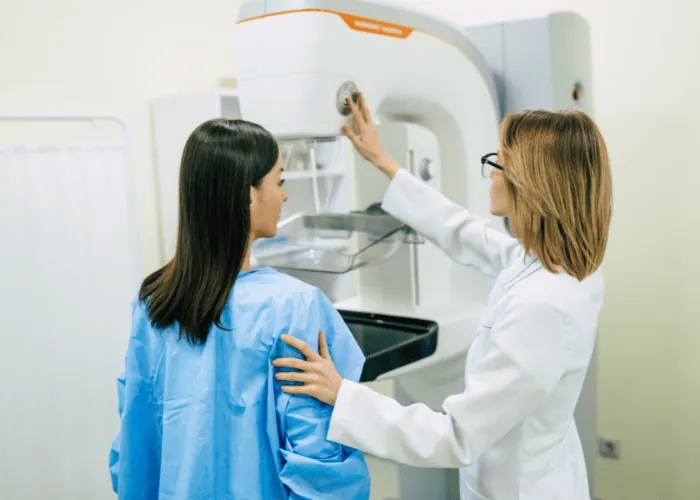Conditions
As a breast cancer surgeon, I care for women facing a wide range of breast health concerns—from routine screenings to complex diagnoses. My goal is to provide clear answers, compassionate guidance, and the highest quality care at every stage of your journey.
Breast Pain
Breast pain is one of the most common complaints I see in my practice. While it’s often related to hormonal changes and usually benign, it can cause significant anxiety. I help my patients understand the nature of their discomfort—whether cyclical or constant—and perform the appropriate investigations, including clinical examination and radiological investigations when needed. In most cases, reassurance and conservative measures are sufficient, but I always take pain seriously and make sure no underlying condition is missed.
Nipple Discharge
Nipple discharge—especially if spontaneous, persistent, or bloody—requires careful assessment. Many cases are benign, linked to hormonal changes or small benign intraductal lesions like papillomas, but sometimes further evaluation is essential. I investigate with imaging and cytology evaluation when indicated, and I guide my patients through the process, from diagnosis to treatment if necessary.
Intraductal Papilloma
Papillomas are benign growths inside the milky ducts, and they can cause clear or bloody discharge. Although non-cancerous, they may contain atypical cells or increase the risk of developing breast cancer. In these cases, I often recommend surgical/vacuum removal. I discuss the findings in detail and tailor the treatment based on each patient’s age, symptoms, and risk factors.
Breast and axillary Lumps
Finding a lump in the breast/axilla can be frightening. Many lumps turn out to be benign—such as fibroadenomas, cysts, inflammatory axillary nodes, accessory breast tissue —but I always take the time to evaluate thoroughly. I often combine clinical assessment with breast ultrasound/mammogram and, if needed, needle biopsy to make a precise diagnosis. Whether the lump requires observation or surgery, I make sure my patients feel informed and supported at every step.
Breast Cancer
Being diagnosed with breast cancer is life-changing. My role is to provide not only expert surgical treatment, but also emotional support, education, and guidance. I offer both conservative and radical surgeries, sentinel node biopsy procedure, and work closely with a multidisciplinary team to create a treatment plan that’s tailored to each woman. My goal is to treat the cancer while preserving identity, dignity, and quality of life.
Nipple or skin retraction and Nipple Lesions
A newly inverted/retracted nipple or a dimpling in the skin can be a warning sign and I evaluate it carefully to rule out malignancy. I examine lesions like eczema-like changes, crusting, or scaling of the nipple, which may indicate benign conditions or early signs of Paget’s disease.
Mastitis and Breast Abscess
I often treat women with breast inflammation or infection—especially during breastfeeding. Mastitis can be painful and distressing, and in some cases, it leads to an abscess that may require drainage or aspiration. I offer prompt diagnosis and treatment, always encouraging women to continue breastfeeding when safe and possible. With the right care, healing is usually quick and complete.
High-Risk breast lesions (LCIS, ADH, ALH)
Lesions like LCIS (lobular carcinoma in situ), ADH (atypical ductal hyperplasia), and ALH (atypical lobular hyperplasia) are not cancers, but they increase a woman’s risk over time. These findings require careful evaluation and follow-up. I discuss these diagnoses in depth, offer risk-reducing strategies, and build a long-term surveillance plan together with the patient and her care team.
Breast Screening
Prevention is powerful. I guide women in choosing the right time and method for screening based on their age, family history, and breast density. Screening can save lives, and I’m committed to making it accessible and meaningful for every patient.
High-Risk Patients (BRCA+ and strong family history)
Women with a strong family history of breast cancer or a known genetic mutation like BRCA1/2 need personalized care. I offer tailored screening protocols, support for genetic testing, and risk-reducing strategies, including lifestyle counselling and surgical options when appropriate. I believe in empowering high-risk women through knowledge, monitoring, and support.
When to See a Breast Specialist?
- Without symptoms for your routine annual checkup
- You feel a lump or thickening in your breast
- You notice changes in nipple shape, discharge, or skin texture
- You experience unexplained breast pain
- You have a family history of breast cancer
- You want a second opinion or preventive evaluation
If something doesn’t feel right—listen to your body. I'm here to support you with compassion and clarity.
